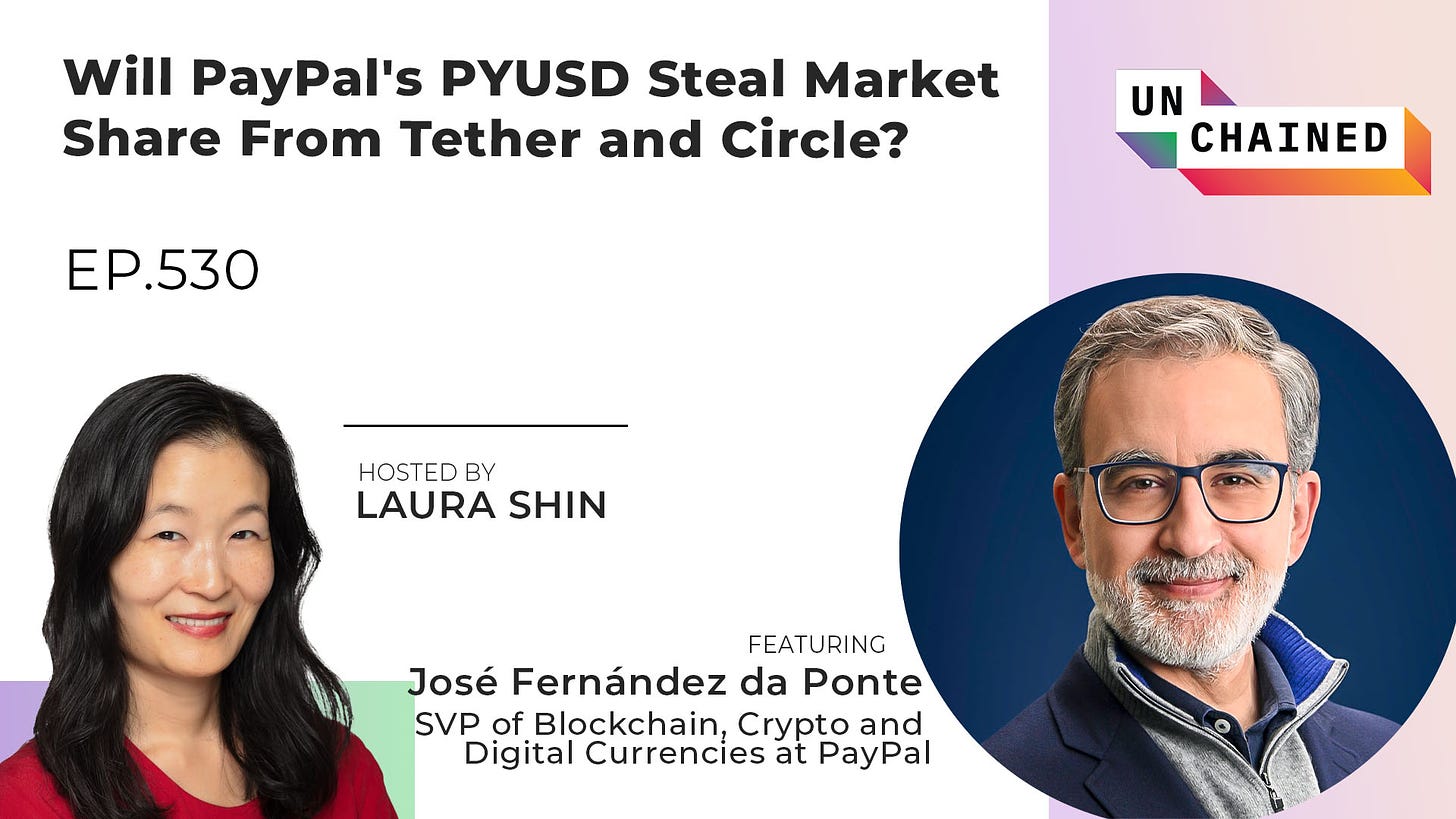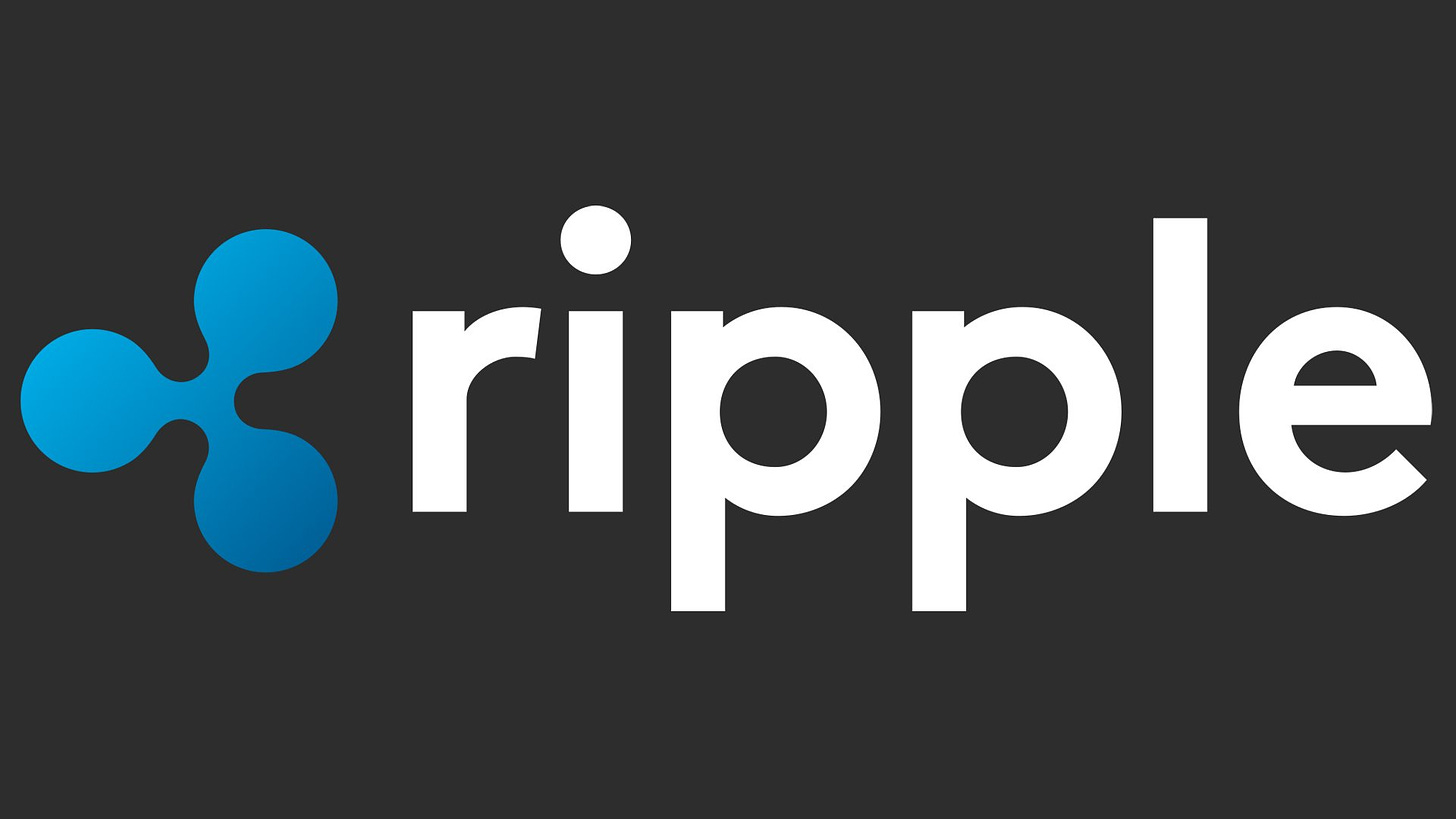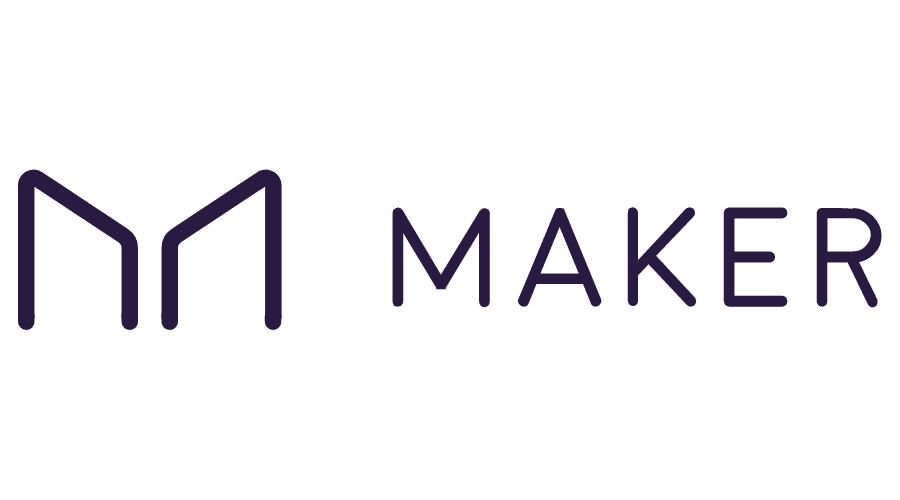Can PayPal Compete With Tether and Cirlce? 🤔
Weekly news recap: ⚖️ SEC challenges Ripple's partial victory, 🚨 legal issues surround FTX, 📈 spot Bitcoin ETFs gain momentum, 🏦 U.S. Fed launches crypto oversight, and more!
PayPal's entry into the stablecoin arena with PYUSD is a strategic move to compete with giants like Tether and Circle.
In today’s episode of Unchained, José Fernández da Ponte, PayPal's crypto SVP, unpacks the company's long-term vision for blockchain-based payments. From the choice of Ethereum to the potential in gaming, da Ponte outlines how PYUSD aims to onboard the masses to on-chain payments. With a 'moderate' short-term expectation and a multi-year journey ahead, PayPal's PYUSD aims to be a significant player in the stablecoin market.
Weekly News Recap
SEC to Challenge Ripple's Partial Victory With Appeal
This week, the U.S. Securities and Exchange Commission (SEC) announced its intention to appeal a partial defeat in its ongoing case against Ripple Labs. The regulator will seek an interlocutory appeal—meaning the rest of the case will continue as planned—specifically targeting the part of the decision related to the sales of XRP on exchanges and “other distributions” including offers and sales of XRP using algorithms, also known as programmatic sales. In July, Judge Analisa Torres ruled that some of Ripple’s programmatic sales did not violate securities laws, while direct sales to institutional investors were securities. In a letter to the judge overseeing the case, SEC Deputy Chief of Crypto Assets, Jorge Tenreiro, argued that the review happening at the same time as the case would "advance the termination of this litigation in an efficient manner," which is lawyer-speak for “not-waste any time.”
Tenreiro proposed that Ripple should have until August 16 to respond, with the SEC filing an opening brief two days later. Gary DeWaal, senior counsel at the Katten law firm, told crypto news site, The Block that “it would not be surprising if Ripple makes a similar request” regarding institutional sales. The appeal process requires approval from the United States District Court, Southern District of New York, and the Court of appeals, followed by permission from the Second Circuit.
Legal Turmoil Engulfs FTX: Charges, Pleas, and Hearings
In a week filled with legal developments surrounding the crypto exchange FTX, former co-CEO Ryan Salame is negotiating a guilty plea with federal prosecutors for alleged offenses including campaign finance law violations, according to a Bloomberg report. It’s “unclear” whether or not Salame's plea could involve testimony against former FTX CEO Sam Bankman-Fried, whose criminal trial is set for October.

Bankman-Fried faces his legal battles as well. In a letter on August 8, the DOJ confirmed Bankman-Fried will face campaign finance-related charges, and Sino Global Capital, a crypto VC, has filed a $67 million claim against FTX and sister-company Alameda. A federal judge has set a hearing for August 11 to consider revoking Bankman-Fried's bail, potentially moving him from house arrest to jail in New York.
Adding to the complexity, the New York Times and Harvard Law School Professor Laurence Tribe have separately argued that Bankman-Fried’s gag order should be lifted, according to a report by the Block over the weekend. In an affidavit dated August 1, Tribe argued that Bankman-Fried has a constitutional right to speak to the media, stating, "The order effectively precludes Mr. Bankman-Fried from saying anything that might influence the public’s perception of him in ways that could help make the presumption of his innocence more than a slogan." In an August 2 letter, the Deputy General Counsel for the Times, David McCraw, also opposed the gag order, citing public interest and First Amendment rights.
Spot Bitcoin ETFs Gain Momentum
The crypto community is closely watching the SEC as it reviews applications for spot Bitcoin exchange-traded funds (ETFs). CEO of Galaxy Digital, Mike Novogratz, reportedly expressed optimism, on an earnings call, stating that approval is a question of "when, not if," and that he expects a decision within six months. Investment managers BlackRock and Invesco have amended their filings to include "surveillance-sharing agreements" with Coinbase, a move seen as crucial for approval.

Meanwhile, CEO of ARK Invest, Cathie Wood, anticipates another delay for ARK's proposed spot Bitcoin ETF, optimistically suggesting that the SEC may approve multiple ETFs simultaneously. Though of course, another possibility is the latest batch of bitcoin spot ETF applications gets shot down just like all the others. Global X has also refiled its application, marking the ninth active spot Bitcoin application. The anticipation has triggered cautious excitement and speculation, with decisions expected as soon as this week.
However, nonprofit financial markets watchdog, Better Markets, urged the SEC to reject spot bitcoin ETF applications, citing concerns about investor harm and potential criminal activities.
U.S. Federal Reserve Launches Oversight on Banks' Crypto Activities
The U.S. Federal Reserve has unveiled a new supervision program to oversee banks engaged with crypto assets and any of a variety of distributed ledger technologies, including blockchain, according to a statement by the central bank’s Board of Governors. The program will be integrated into the existing supervisory process, with experts designated to work with banks involved in these "novel activities."

The degree of supervision will be risk-based, presumably meaning the more contact with crypto, the more requirements, and certain banks will be routinely monitored depending on their engagement level. State banks wishing to venture into dollar-token or stablecoin activity must receive written non-objection from the Federal Reserve.
The central bank's guidance emphasizes the need for appropriate risk management, including systems to identify and monitor potential risks such as cybersecurity and illicit finance threats. While some on social media have portrayed the program as “legitimizing” the technology, by now it should be clear to anyone who has been paying attention to similar programs announced by the SEC over the years that having a path to compliance is no guarantee of approval.
MakerDAO Spark Protocol Blocks VPNs Amid DAI Savings Rate Changes
MakerDAO's decentralized DAI liquidity market, Spark Protocol, has restricted access to U.S.-based users, and just in case, anyone else using a Virtual Private Network (VPN), to cover their tracks, sparking criticism from privacy advocates. The move coincides with the implementation of an Enhanced DAI Savings Rate (EDSR), temporarily raising the DAI Savings Rate (DSR) to 8% in order to incentivize more participation.
MakerDAO founder Rune Christensen has since proposed reducing the EDSR to a maximum value of 5%, citing unintended consequences of the rate being exploited by large-scale Ethereum whales. The proposal also aims to ensure the EDSR benefits regular DAI users rather than just the richest investors. The changes in the DAI savings rate and the VPN blockade have ignited debates on the sustainability of such an offer, concerns about decentralization and the balance between profit and principle within the crypto community.
Worldcoin Faces Regulatory Scrutiny and Technical Glitches Amid Global Rollout
Worldcoin, the eyeball-scanning crypto project launched by OpenAI CEO Sam Altman, has faced a series of challenges this week. Following the Kenyan government's suspension of the company's activities to assess legality and data protection, Nairobi police raided a Worldcoin warehouse, seizing documents and machines for examination, according to Kenyan news site, Kahawa Tungu. Kenya's Office of Data Protection Commissioner, Immaculate Kassait, told local news site, KTN News, that her team asked Worldcoin parent company, Tools For Humanity, to stop collecting personal information in May.
Meanwhile, in Bavaria, Germany, the Data Protection Authority said it was still reviewing the project when it went live.
On Monday, Worldcoin's mobile app experienced some technical difficulties limiting users' access to wallets, with the support team attributing the issue to "higher than usual traffic."
Digital Currency Group Faces Inquiry by New York Attorney General
The New York Attorney General (NYAG) is probing Digital Currency Group (DCG) over its financial dealings with its subsidiary Genesis Global Capital, according to a Bloomberg report. The investigation, which had not been officially confirmed at the time of the report, is said to focus on loans and transactions between DCG and Genesis, including a $575 million loan accepted by DCG from Genesis last year. The NYAG's office, led by Attorney General Letitia James, is reportedly also concerned about a $1.1 billion promissory note declared by DCG CEO, Barry Silbert.
The probe is part of a broader examination into crypto lending, raising questions about consumer protection, market manipulation, and systemic risk. While no formal complaints have been issued, the SEC and federal prosecutors are also reportedly examining the firm. DCG told Bloomberg it is working with regulators and investigators, emphasizing that the transactions were conducted according to standard market procedures.
Huobi Faces Insolvency Rumors and Massive Outflows
Crypto exchange Huobi has been embroiled in controversy this week as rumors of insolvency and police investigations circulate. Data from Nansen shows over $40 million worth of outflows from the exchange in the last week, with total value locked (TVL) dropping to $2.5 billion. The outflows followed social media posts claiming that senior executives were being arrested by Chinese police, and allegations of money laundering involving Huobi and Tron founder Justin Sun. Analyst Adam Cochran claims Huobi is likely insolvent, pointing to a rapid selloff of the stablecoin USDT and a discrepancy in the stablecoin’s reserves. Huobi's head of social media said, "This malicious rumor has been confirmed untrue, and Huobi is currently doing well." Despite the denial, the situation led to a sizable drop in Huobi Global's stablecoin exchange balance in the past week.
On Tuesday, an address reportedly related to Sun transferred 200 million USDT and 5,000 ETH into Huobi, though a Huobi spokesperson denied Sun's link to the addresses. The unfolding situation has raised concerns and debates within the crypto community.
OPNX Bids $30 Million to Acquire Bankrupt Crypto Lender Hodlnaut
OPNX, a digital asset exchange founded by the creators of the defunct hedge fund Three Arrows Capital (3AC), has bid to acquire the bankrupt crypto lender Hodlnaut. The offer includes a $30 million capital injection of OPNX’s native FLEX tokens, which would result in OPNX owning 75% of Hodlnaut. FLEX, however, is one of two tokens associated with OPNX, which was originally named GTX after its similarities to the defunct FTX. The bid comes not only as Hodlnaut's restructuring plan comes under court supervision in Singapore, but as US courts seek a response from 3AC co-founder Kyle Davies.
Curve Finance Offers $1.85 Million Bounty for Hacker's Identification
Curve Finance, the decentralized finance platform that lost over $60 million in a recent exploit, has opened a $1.85 million bounty to the public to identify the hacker. After the hacker partially returned stolen funds to other affected protocols but not to Curve, the platform extended the bounty, initially offered to the hacker, to anyone who could lead to a conviction. The hacker had previously written, “I’m refunding not because you can find me, it’s because I don’t want to ruin your project.”
FUN BITS 😁
Anyone looking for a laugh today should tune in to hear standup comedian Ginny Hogan elucidate Elon Musk confirming there will be no cryptocurrency for X, formerly known as Twitter.
If You Like What You Read:
👯♀️ refer Unchained with a friend and earn a Premium subscription
👍 follow Laura on Twitter, Facebook, Instagram, TikTok, Mastodon and/or LinkedIn
🎧 subscribe to Unchained on YouTube, Apple Podcasts, Spotify, Google Podcasts, Pandora or wherever you get your podcasts
and/or 📚buy my book, The Cryptopians: Idealism, Greed, Lies, and the Making of the First Big Cryptocurrency Craze











